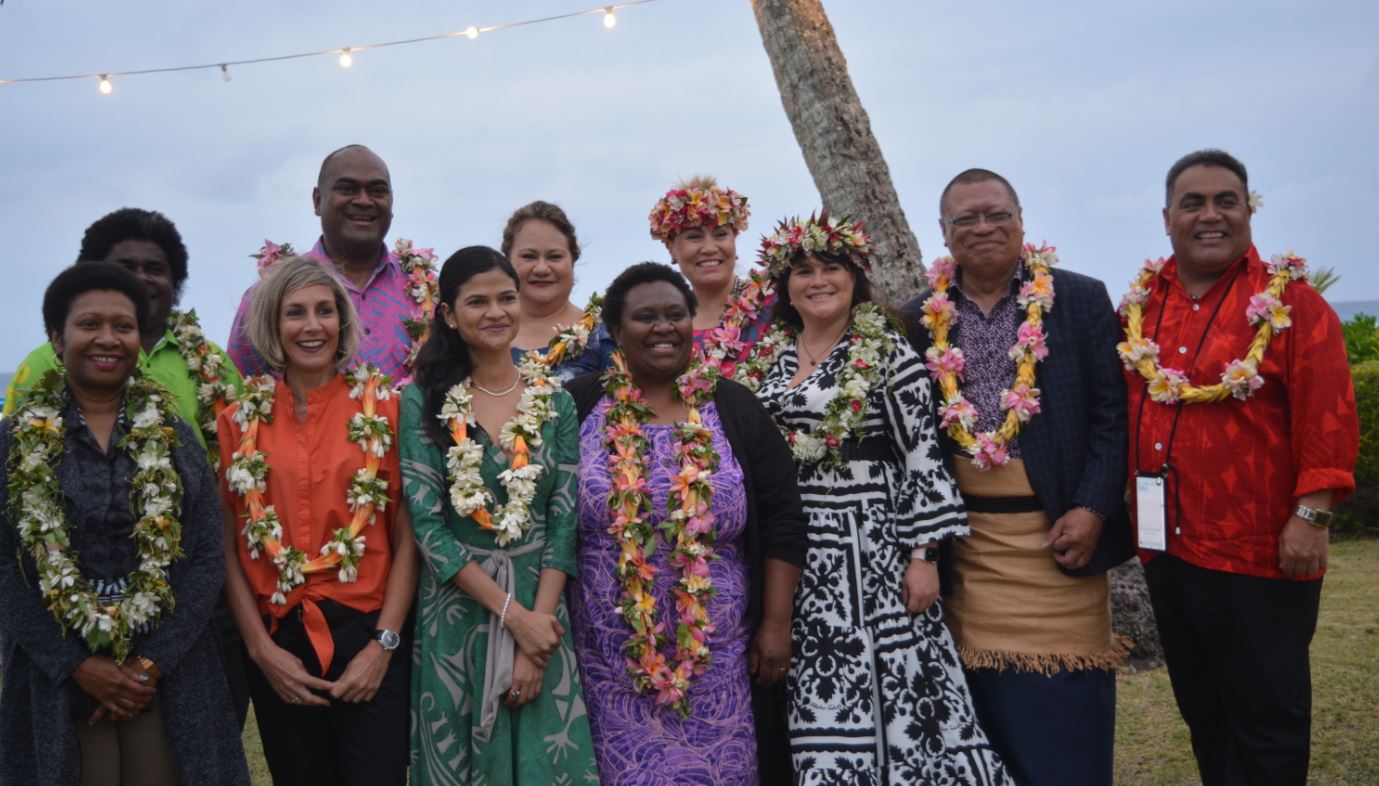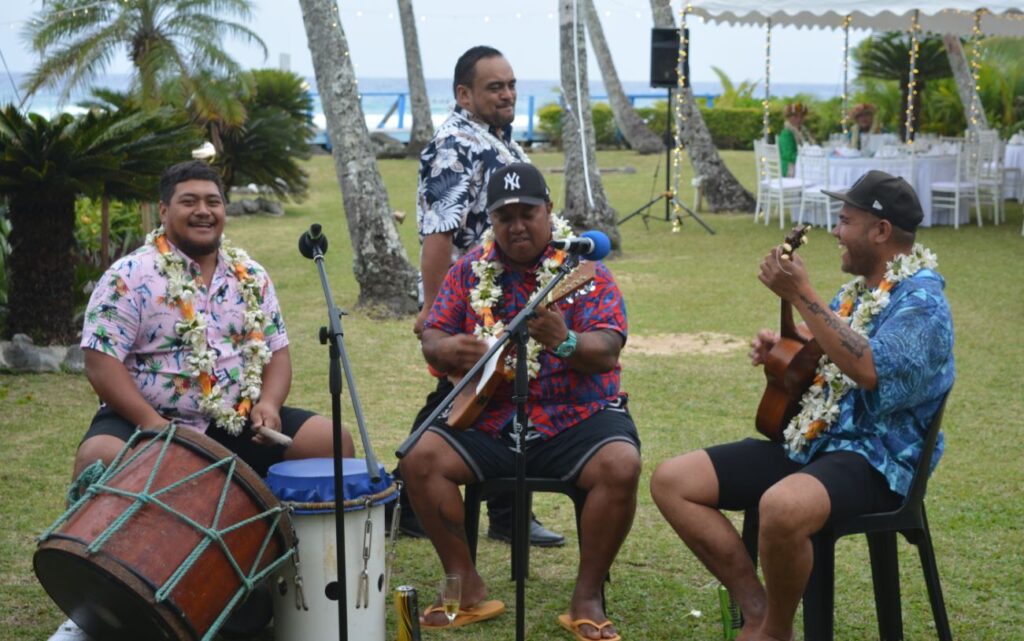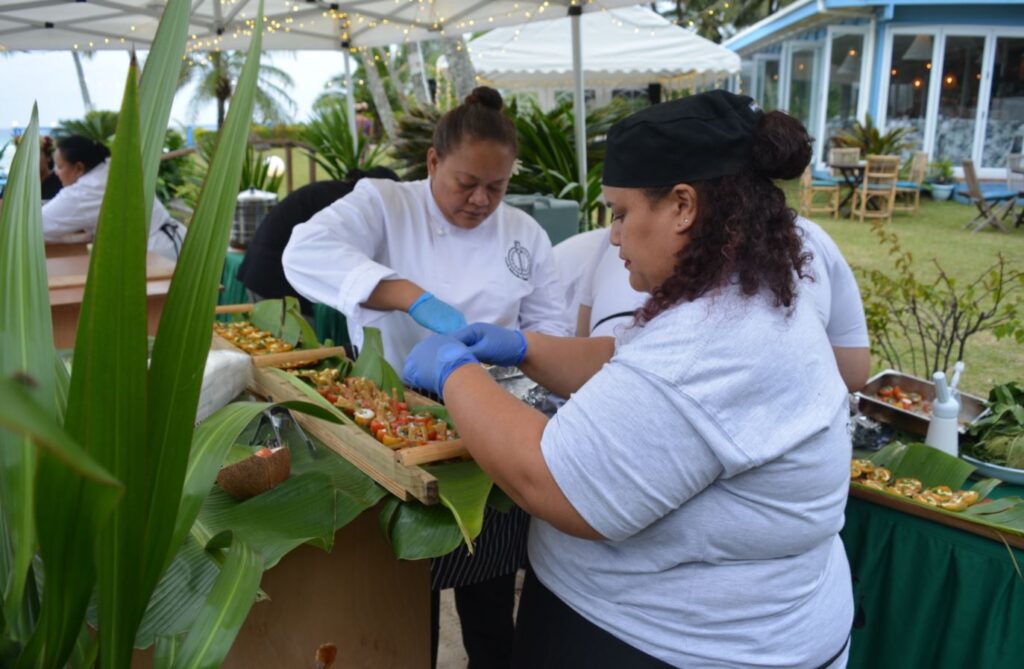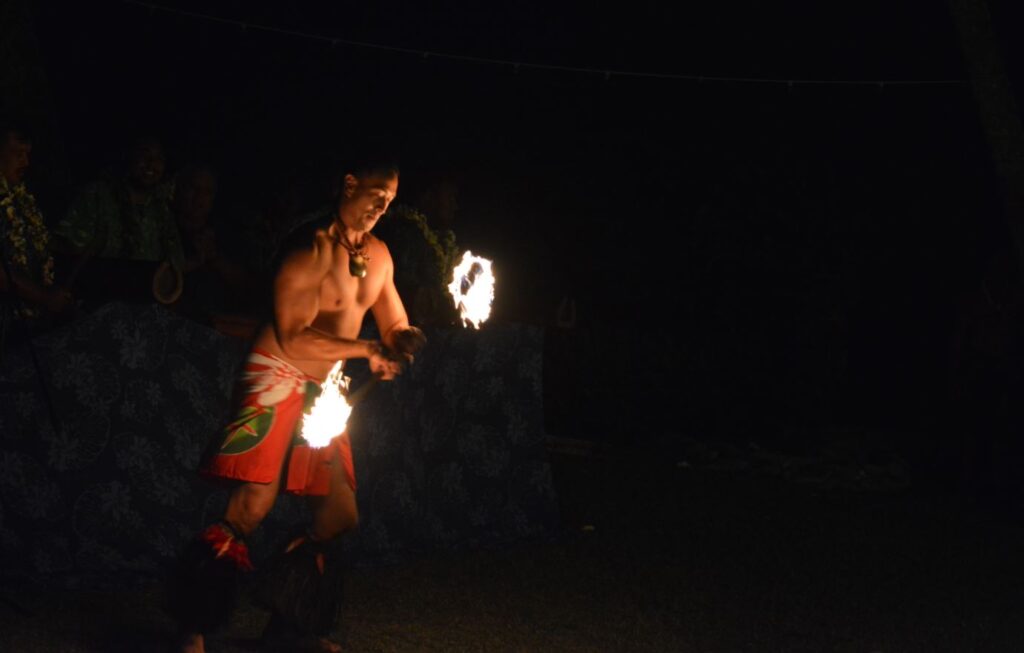Sustainability versus economic recovery: It’s a balancing act
Saturday 5 November 2022 | Written by Al Williams | Published in Economy, Features, Local

Tourism leaders from across the Pacific gather at Tamarind Restaurant for the finale evening on Thursday. PHOTO: AL WILLIAMS/22110410
It’s been a massive week for tourism in the Cook Islands as industry representatives from multiple nations have descended on Rarotonga to focus on sustainability. However, there is still uncertainty in the region as it’s a battle in an ever changing market.
The Pacific Sustainable Tourism Leadership Summit culminated with Cook Islands and 12 other signatories endorsing a range of tourism leadership recommendations.
Those recommendations will now be used to guide the Pacific Tourism Organisation (SPTO).
The recommendations document shows the challenge is to find a balance between the economic urgency of recovery for local providers, the preservation of unspoiled environment and the authenticity of cultures.
“The current global environment is now more favourable than ever to regulate industries, reverse old trends and set up new rules of conduct, that have an authentically local voice.
“Sustainability must be the rule, not the exception,” the document says.
“In order to future-proof our industry and secure our livelihoods, we require accessible and effective climate financing options and commitments that adequately address the impacts of climate change in our Blue Pacific, particularly for our most vulnerable countries that have suffered loss and damage.
“Development partners and Pacific carriers have an important role to play in ensuring that tourism’s benefits are equally dispersed throughout our region, particularly for Small Island States and Territories that have unique but important considerations in relation to improving and maintaining air connectivity and access.”
Access to climate finance continues to be an area of concern for the industry.

Cook Islands was on display in all its glory at the tourism themed event. PHOTO: AL WILLIAMS/22110411 
Local cuisine was on offer as industry representatives arrived. PHOTO: AL WILLIAMS/22110412 
Guests were treated to a taste of Cook Islands culture. PHOTO: AL WILLIAMS/22110413
“Not only is the Pacific disadvantaged by access at the global level but at the national level, internal systems often present numerous challenges in terms of enabling access and dispersing benefits to local communities.
“Tourism has always been a people- centric sector. However, that focus needs to become more inward looking and holistic in nature. We must put the well-being, empowerment and resourcing of our people first in order to ensure that Pacific tourism can withstand future shocks.
“We must re-design the narrative, so as to reflect our shared perspective that all people matter, but when we discuss Pacific Tourism we must ensure that our people matter the most.”
It’s a balancing act.
The SPTO indicated it is now pushing forward with the next phase of its Pacific Digital Tourism Transformation Project in an effort to accelerate Pacific tourism in the shadow of Covid-19.
Through the second phase of a two-phase programme, Pacific nations will “remodel tourism development and marketing strategies by embracing greater use of digital technologies, and through building digital skills”.
The funding arrangement — totalling NZ$4 million over a four-year period — recognises tourism as a key driver of economic growth and prosperity in the Pacific.
The programme aims to deliver a range of training and ongoing support for SPTO and national tourism organisations in the Pacific, as well as supporting SPTO-led projects in the areas of digital marketing, advocacy and communications, and sustainable development and research.
In a written statement, Associate Minister for Tourism for the Cook Islands Tingika Elikana said, through updates provided at the SPTO meetings in Rarotonga over the past week, the council emphasised its commitment to supporting the regional tourism body in its efforts to strengthen regional air connectivity, “for the benefit of all of SPTO’s Pacific island members”.
According to Elikana “proper recognition and extended–term support” will help the Pacific tourism industry “build back better, to be more resilient sustainable, inclusive, and equitable”.
In addressing the summit at the final meeting on Thursday evening, Elikana said it is time to be practical in terms of looking at tourism through a post-Covid-19 lens.
A shift to “regenerative” tourism would require realistic “people-centric” goals and solutions.
Closure of international borders had given travellers time to consider the impact their travel choices have on climate, environment and communities.
“This means both the supply and demand sides of the travel equation are now more likely to lean towards responsible and regenerative practices.”
In listing practices in action in the Cook Islands, he mentioned Mana Tiaki initiatives, such as Vaka Pride on Rarotonga and Te Vaka O Ru on Aitutaki as examples.
“They all work towards keeping our environment pristine and our traditions alive, and all of which benefit directly from tourism funding and support.
“We need to incorporate more such initiatives as we begin to transform our approach to tourism and flip the switch.
“Do we truly understand or appreciate just how powerful tourism can be for our overall wellbeing, if we can harness its full potential?
“How tourism can help our islands, our oceans, the fish, the birds, and everything in between flourish and thrive?”
Tourism veteran and Rarotonga based SPTO marketing committee chair and board member, Robert Skews remains sceptical.
He lists immediate concerns.
“Airlines always and connectivity for some smaller nations, the environment and how we protect it going forward.
“All nations have similar goals and SPTO collates those into workable guidelines and policy.”
For the Cook Islands, a lack of crew and aircraft has resulted in the country missing out in terms of Tahiti and the profitable northern hemisphere market, he says.
“Sydney and Los Angeles routes are essential for our tourism, especially if we are to follow the launch of the development strategy and regenerative tourism.”
With Cook Islands heading into low season, Skews says it is northern connections that make January to March bearable.
“… without Sydney and LA connections, and Kiwis on holiday at home, while there are no real Australia connections. We need direct Australia flights to get Australia numbers back to 25-30,000 people per annum.
“They spend more and more, Australians go to Aitutaki.”
North American connections are needed to get Europeans and Americans here, he says.
“We will get limited Europeans access through NZ but US connects most importantly, as the LA flight in past brought over $30 million directly into the economy.
“With the USD so strong now, and our holiday options price wise, better than Fiji and Tahiti, we could be getting this business if we had connections
“It has always been the northern markets that make our off season a shoulder season and that will not be the case this year.”
Government needs to address the airline situation, as they have been discussing with Cook Islands Tourism, he adds, “or we may regress to a one dimensional NZ market essentially with the high peaks and lows of the 90s and early 2000s”.
“We cannot look at this year as a benchmark for going forward as we achieved what we have on the basis of being the first country open with limited restrictions, people had not spent on holidays for two years, the NZ dollar falling and effects of house loans, interest jumps and general softening of the NZ economy, and more airlines flying to other destinations.”
About SPTO: Established in 1983 as the Tourism Council of the South Pacific, the Pacific Tourism Organisation (SPTO) is the mandated organisation representing Tourism in the region. Its 21 Government members are American Samoa, Cook Islands, Federated States of Micronesia, Fiji, French Polynesia, Kiribati, Nauru, Marshall Islands, New Caledonia, Niue, Papua New Guinea, Rapa Nui, Samoa, Solomon Islands, Timor Leste, Tokelau, Tonga, Tuvalu, Vanuatu Wallis and Futuna, and the People’s Republic of China.














































